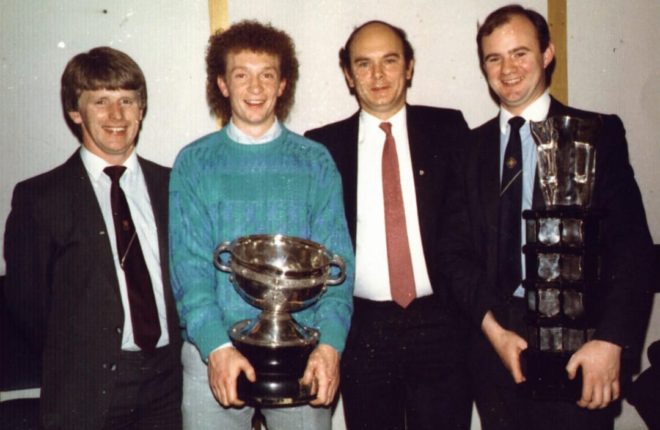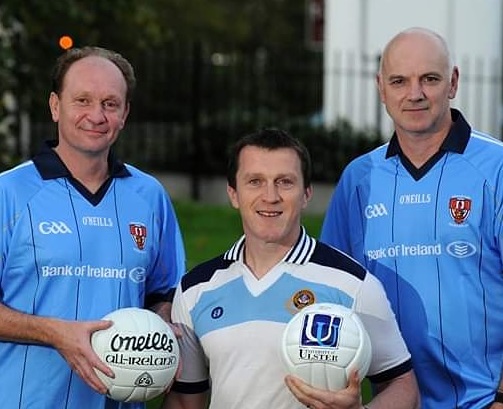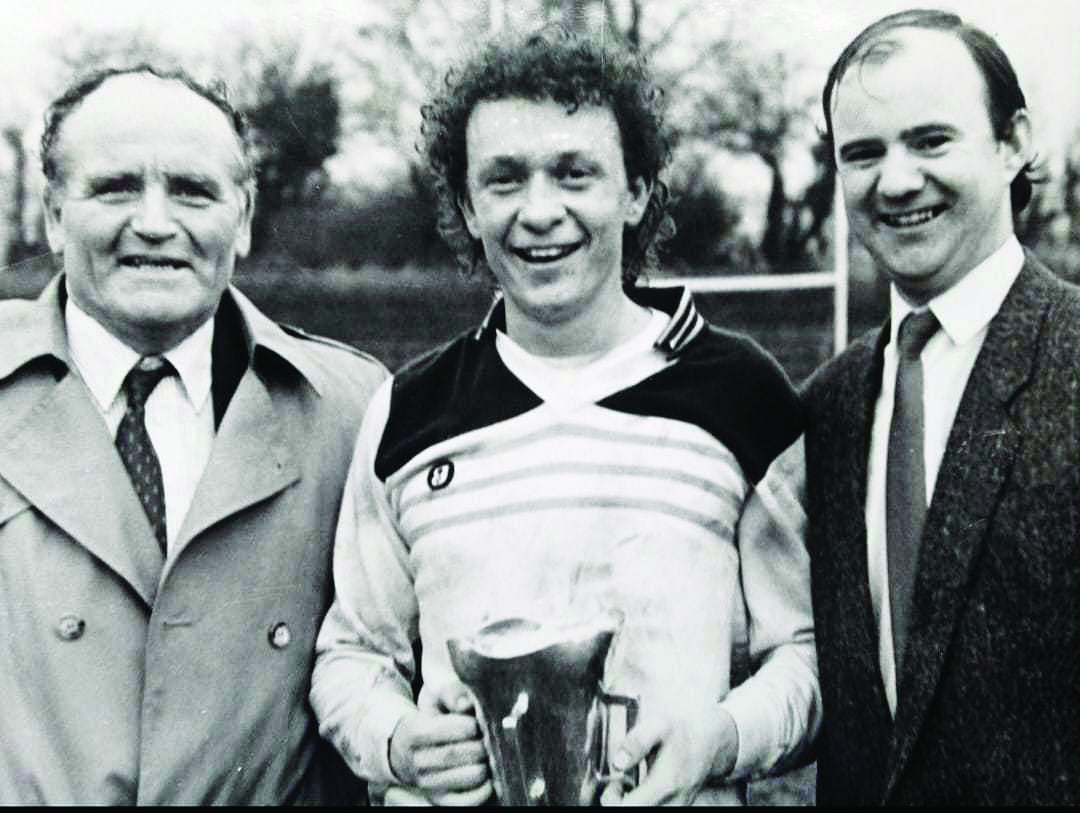When DJ Kane left Newry to study in UUJ, his MacRory Cup rivals became his teammates during their golden era in the Sigerson Cup. Michael McMullan writes…
DJ KANE remembers the muck and gutters all too well, a patch of ground on the Jordanstown campus with no goalposts. When the rain poured down in the winter months and the playing fields were closed for their own good, UUJ manager, the late Charlie Sweeney, improvised.
Under the shadow of Dalriada House, those gruelling training sessions put enough in the legs to withstand three days of Sigerson football as it was in old money. Eight teams on a Friday, whittled down to two by Sunday until one team prevailed.
University football has changed. Sigerson is now shoehorned into a calendar that has no space for it.
Now, all the students are based in the new all singing, all dancing ‘Ulster University’ campus in Belfast. The Jordanstown Sports Village, as it is now known, is for sport alone.
DJ Kane’s memories were of a totally different student experience, one he remembers fondly.
A student in Newry’s Abbey CBS, he wanted to study sport at university. Jordanstown or England were the options on the table. Thomond College in Limerick had a similar course.
Donal Durkin, a future teammate on the 1986 Sigerson team who played football with him in Newry Shamrocks, was a few years older than him and sang the praises of student life in Jordanstown.
“I knew Tommy Joe (John Farrell) and a few friends who were doing the course a few years before me,” Kane begins.
“I heard there was a great Gaelic club and plenty of craic out socialising as well as the football.”
In the days before a Sigerson Cup tradition Kane and his trailblazing squad built, these were the key selling points – sport and craic.
“From my year at the Abbey, about 10 or 11 came down. Some were footballers and some weren’t,” Kane added.
He lost two MacRory Cup finals to St Patrick’s, Maghera during the Derry school’s golden era. By the student days in Belfast, that rivalry evaporated.
“Once the football started, you met the guys from other schools you’d have played against and maybe fought against,” he offers.
“All of sudden, we were training together and were on the one team, so you weren’t long at making new friendships.
“Between Maghera and the Abbey, there was a big rivalry in those days. In my Fresher year, you’d guys like Enda Gormley, Rory Scullion and ‘Spoofer’ (Dermot McNicholl) that we’d have played against.”
Fresher football is unique. Everyone is the same boat, learning to live away from home on a shoestring budget. The other challenge is finding that vital balance between studying, playing ball and having a ball.
“Everything was based out in the Poly (UUJ campus in Jordanstown) and, generally, everyone lived in the halls there in their first year.
“You were mixing every day, the training and the social side of it based up in the Student’s Union.
“You were knocking about together morning, noon and night, living in each other’s pockets, so it wasn’t long before those friendships built up as opposed to being rivals before you arrived.”
At the start, it was “stand offish” before morphing into a week of training, going to class and partying. Slagging was par for the course and the friendships that grew have stood the test of time.
“We did win the Freshers All-Ireland that year (1985) and we had a really good team and Raymond Munroe was our captain,” Kane recalls.
“There were a lot of talented players that came out of the MacRory system. Charlie Sweeney was manager, who has since passed on. The standard was good and we came up against some great teams.”
The final was a comfortable win over Queen’s, but it took late drama to make it through the semi-final against UCD.
“We had just conceded a goal and literally we went up the field inside 30 seconds and (Enda) Gormley put the ball in the net to win it,” Kane pointed out.
“The final was played in Casement, so we went into the club under the stand before heading across the road to the old Whiteford Inn…we had good celebrations for quite a while in Belfast.”

DOUBLE…Charlie Sweeney (RIP) manager, DK Kane, captain, Dr Mick Loftus (RIP), GAA President, and John Farrell, UUJ President, with the Ryan and Sigerson Cups
Charlie Sweeney took over as Sigerson manager for the 1986 season with Eamonn Coleman with him on a part time basis due to work commitments in England.
Sweeney took most of the training, with Coleman there as his assistant before coming on board with more regularity.
“When Eamonn was home, he’d have been up with us,” Kane remembers. “That continued for a couple of years.
“It ended up a really good relationship. Charlie had been with us as Freshers, he knew a lot of us from the first day and up into second year and into third year.”
Sweeney was almost like a “father figure” to the group, having come on board at the same time on a journey they brought so many memories and no shortage of success.
He was gentle by nature, but wasn’t behind the door when the hairdryer treatment was needed.
“Eamonn, in fairness, was more direct and brutally honest when he needed to be. They complemented each other fairly well,” Kane said of his management duo.
“In terms of football, they knew what they were doing so it was a good combination.
“When you needed a rollicking, Eamonn would give it to you and when you needed an arm around you Charlie would give it to you…but you’d have got either off both of them.”
The UUJ club was founded in 1973 and 1985 saw them compete at Sigerson level for the first time but lost 13 players from the panel – including seven starters – due to an eligibility issue.
It merely poked the bear and UUJ would make their mark 12 months later when UCC hosted the competition on the banks of the Lee.
They were progressing, but Kane admits they were “far from favourites” on a landscape where the traditional superpowers of UCC, UCD, UCG and Queen’s were at the forefront.
“We were newcomers and not much was expected of us,” Kane said of their placing. “We had a really good team, very strong physical team and Charlie trained us hard.”
It was well before the days of sports science and GPS trackers. Feedback was the odd kick in the backside or the curly finger before being called ashore.
“We used to train on a patch of ground down in the halls, down beside the doctor’s surgery,” Kane remembers of those character building days in Jordanstown.
“The weather was so bad they’d close the pitches. We were running around in that…it was just muck and gutters, there were no goalposts. Training was fairly brutal but when it came to the weekend for Sigerson, we were ready.
“A lot of the guys were getting training with their counties so they were in really good shape and we might have come in under the radar a bit.”
The hard yards paid off with the quarter-final needing extra time, as DJ explains.
“The training was geared for that, playing three games three days in a row and if you blew up on a Saturday, then you were stuffed…that’s the bottom line.
“The odds of winning it were stacked against you. You needed a big panel with boys going down with cramp, injury or just didn’t last the three days.
“You needed to be very fit. I know football has changed a bit, but in those days it was very competitive and it was very tough.
“There were a lot of bangs going on around the place so you had to be at yourself to keep it going for three days.”
Goals from Tommy Maguire and Donal Durkin got ‘The Poly’ off to the perfect start in the quarter-final with UCD, but it took extra-time goals from Gerard Houlihan to see them through on a 4-9 to 2-9 scoreline.
Maynooth, who shocked Queen’s in the last eight, were the semi-final opponents and were no match as Jordanstown waltzed to a final clash with a UCC team managed by Mick O’Dwyer.
Level 0-3 each at the break, it was Enda Gormley (0-5) and Houlihan (1-2) that shot UUJ to a historic first title in UCC’s backyard.
“Extra time (against UCD) was tough, but the final sticks out because we were playing Cork in front of a big crowd in the Mardyke,” Kane said.
“It was the first time we were there and we’d be away staying in the hotels, some of the most memories are from afterwards it at the banquet.”
The following year’s competition was hosted by University Ulster, Coleraine and UUJ were raging hot favourites and had retained their Ryan Cup (league) title.
“The older lads had finished their degrees and went on. We were all a year older and there was a turnover of players,” Kane explained of the changeover.
“There were a few of the younger lads coming though. Derry, Down and Tyrone were biggest contributors in terms of players, with a few from the other counties.
“We had just won the Ryan Cup again, we had dominated university football and we hadn’t lost a game.
“We were big favourites to come through and win it again, especially with it being up north.
“We were slightly a better team the second year, so there was pressure and expectation for us to go on and win it.”
UUJ had to do it without the injured Houlihan and Mal O’Hare who came off the bench in the 1986 decider in Cork.
The first game of the weekend was another showdown with UCD who were 0-5 to 0-2 ahead at half time. Charlie Sweeney and Eamonn Coleman offered a few home truths in their half-time messages.
It had the desired effect with Dermot McNicholl, Enda Gormley, Declan Canavan and substitute Mark Bohill kicking points for a side with a greater pep in their step on the way to a 0-7 to 0-6 victory. They were dealt a slice of luck when Ronan O’Flaherty’s late shot for goal flashed past goalkeeper Cathal Canavan’s post.
After another semi-final win over Maynooth it was off to Bellaghy for another final meeting with UCC. Gormley and Cathal McNicholl had UUJ three points ahead in a low-scoring encounter on a wet afternoon thanks to a midfield foothold of Cathal Glass and man of the match Stephen Conway.
Cork stars Barry Coffey and Paul McGrath brought UCC back into the game before a Gormley score and late save from Canavan – tipping a Coffey shot over – ensured UUJ retained the title.

CAPTAINS…DJ Kane (1987), Noel Donnelly (1991) and Colin Harney (1986) captained UUJ to Sigerson titles
Colin Harney was the 1986 captain, but this time it was DJ Kane who hoisted the trophy aloft in celebration to cap off an unbeaten two seasons.
“In the final, it was wet and it probably was a dour game but when you come through the other side we were happy enough,” Kane remembers
The feeling in the camp pointed towards retaining the trophy in Maynooth 12 months later being a reality.
But it wasn’t to be. Kerry legend Maurice Fitzgerald landed 12 points from frees for UCC in a 0-13 to 0-10 quarter-final win on their way to the 1988 title in Maynooth.
“They were waiting on us,” Kane said, with the hurt still in his voice.
He admits to a below par performance, but a less than favourable pitch didn’t help and there was the decision to rule out a late goal.
“We didn’t play particularly well and we struggled right to the end when Barry Breen scored a goal to win the game,” Kane offers in frustration.
“The ref disallowed it and that was us out. Needless to say, we weren’t happy about it, we felt we were done out of it.
“It got a bit tasty and feelings were running high… even after when coming out of the changing rooms. We were good enough to go on and win three in a row…definitely. We had a really good team again.”
St Mary’s won their first Sigerson in 1989 with Queen’s keeping the cup in Ulster the following season.
However with damage done to Trinity boathouse – with items chucked into the river Liffey – led to an end to the Sigerson in its weekend format.
Val Kane, brother of DJ, came on board as UUJ manager for the 1991 season when the competition was played over separate weekends.
“I was giving him a hand,” DJ recalls. “I was still in Belfast and we are all living together, running around and going out together
“It was different being on the sideline, but we still ran around together morning, noon and night. When (Dermot) McNicholl came back from Australia, he played for a year in his last year and we won it that year.”
Eight points from captain Noel Donnelly and McNicholl’s return from injury helped Jordanstown to a facile preliminary round win over Maynooth.
A James McCartan goal left Queen’s level at half-time in the quarter-final for UUJ sneaked away for victory despite a fine all round performance.
Five points each from Donnelly and Gary Mason, with Larry Strain finding the net – easily saw off Athlone RTC to clinch a place in the decider against UCG, a game played in Enniskillen’s Brewster Park.
UUJ got out of jail when Niall Finnegan squandered three goal chances – including two penalties – for UCG who only led 0-5 to 0-2 at the break.
In a low-scoring encounter, two points from substitute Mark Gallagher was enough for UUJ to take title number three.
While it was DJ Kane’s third Sigerson triumph, Dermot McNicholl and Padraig O’Neill went down as the first players to pick up three medals as players.
It was a season DJ won the first of two All-Ireland medals with Down, lifting Sam as captain three years later. Life on the university scene played a part. It wasn’t until he arrived at Jordanstown that he represented the county – at u-21 level.
He is an advocate for Sigerson as a bridge for players not having graces county minor teams.
“The standard of players that were in Ulster at the time, coming out of the schools’ system were good,” Kane said of the lie of the land in the Sigerson Cup.
“They were all good players, with lot of work done and when we came together as a team, we were as good as anybody in Ireland.
“The UCC boys were playing for Cork and winning All-Irelands, Maurice Fitzgerald was playing university football…the Galway guys were playing at county level.”
It was a confidence they’d take back to their counties, especially Derry Down and Tyrone at that time. Add in the success of Queen’s and St Mary’s to form a bank of players having pitted themselves against the top players from across Ireland.
“For us (Down), we’d had said we’re as good as anybody floating around here and the other teams began to realise these guys are decent here,” Kane added.
“Everybody knew about Greg Blayney and that James McCartan was great, so throw that into the mix you were beginning to think we should be winning things because we were good enough. I thought, in those days that if you didn’t progress, Sigerson football was as good a standard of football in Ireland.
“It gave guys the opportunity to show county players they could play at this level and hold their own and be good enough for county football,” said Kane, who ticked that box after experiencing MacRory football in Abbey. That gave me a chance to show I could have a go a county level and it would’ve been the same for players in other counties.
“University football had a higher profile than it has now. It was a big thing and taken seriously by the universities, by the players and counties didn’t mess around the way they do now.
“It was a very prestigious competition all over Ireland and a very established competition and held in a really high regard in the south…nowadays I get the feeling it is not like that.”
That’s the reality of the current GAA calendar. It was a different environment 28 years ago when a fresh-faced DJ Kane picked up an All-Ireland Fresher medal. It was only the beginning of a decorated UUJ career.
The nostalgia will continue later this year when the club marks 50 years of GAA in Jordanstown. It will be an occasion to remember, culminating in a banquet in Bundoran’s Great Northern Hotel.
It’s sure to be a weekend of chat and craic, with stories recalled from days of old, tapping in the club motto – ‘Friends for Life’.
All past members, camogie, hurling, handball, ladies and men’s football are asked to provide an email to ensure you keep in touch. Please register online at ulsteruni.gaa.ie.
“Once the football started, you met
the guys from other schools you’d have played against and maybe fought
against them.”
“It was just muck and gutters, there were no goalposts but when it came to the weekend for Sigerson, we were in good shape.”
“That gave me a chance to show I could have a go a county level and it would’ve been the same for players in other counties.”
Receive quality journalism wherever you are, on any device. Keep up to date from the comfort of your own home with a digital subscription.
Any time | Any place | Anywhere












